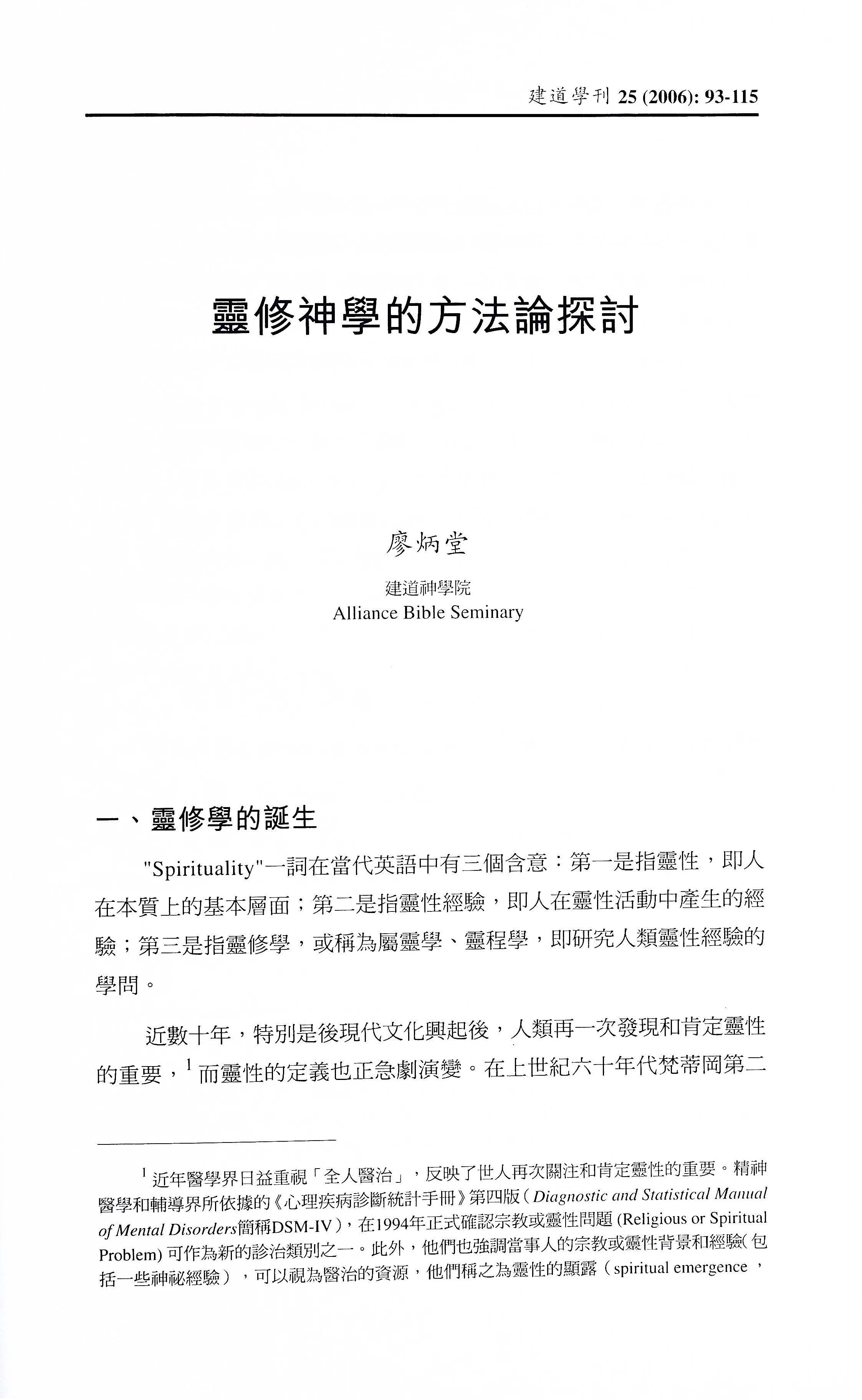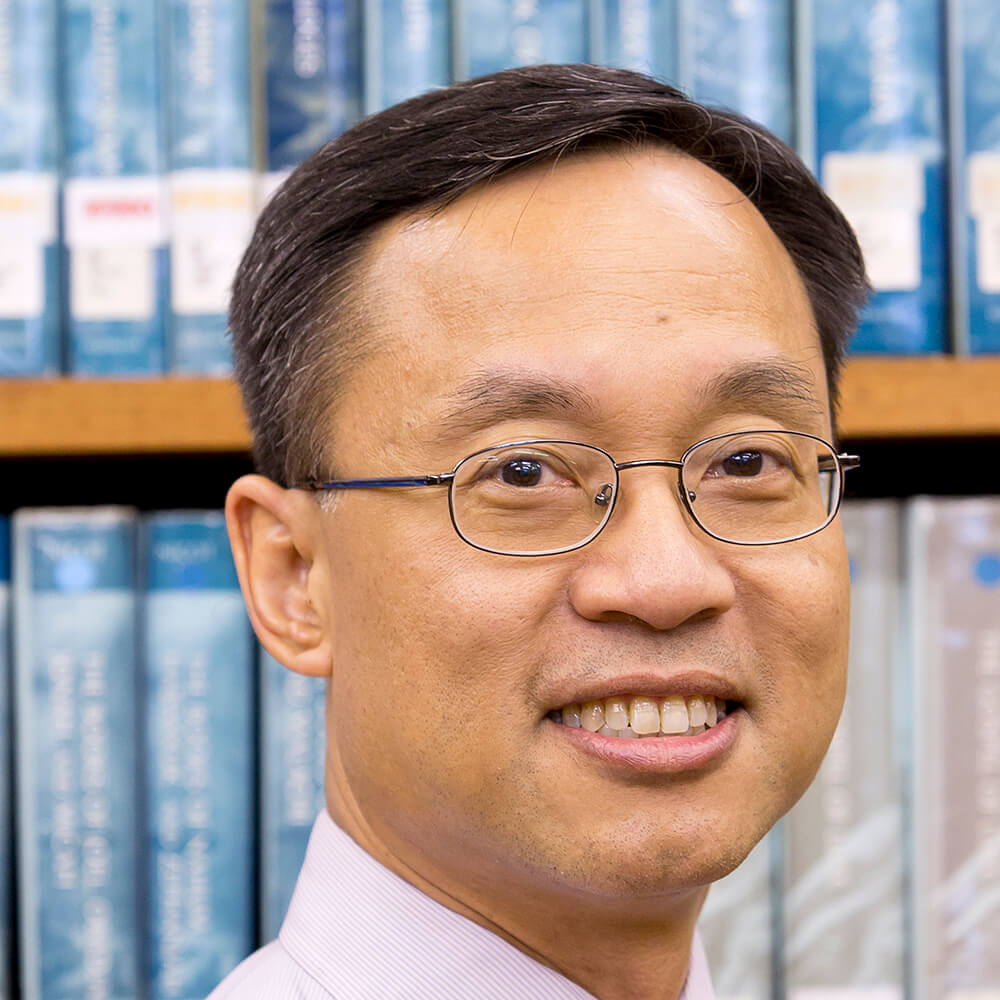靈修神學的方法論探討/廖炳堂
撮要
在上世紀八十年代的學術文化界中,靈修學(Spirituality)這名稱日漸普及,漸漸有取代靈修神學(Spiritual Theology)的趨勢。這種情況並不僅是學科上的名分之爭,背後其實反映了當代學術界對靈性或靈修的本質,以及研究方法的歧見。本文主要從福音信仰的角度,討論施麗蒂(Sandra Schneiders)對靈修學的觀點。
施麗蒂認為靈性是人的本質,靈性經驗基本上也是一種人文現象,而不一定是宗教現象,因此靈修學作為學科的研究進路,是跨科際、跨宗派和跨宗教性的。我們認為靈修學基本上依循了宗教學的社會科學研究方法,與靈修神學的神學進路截然不同。此外,靈修學也不是全無預設價值取向(value free)和純客觀的描述:它預設人類普遍的靈性經驗是同質的,並接受宗教/文化多元並排論(pluralism)作為界定「屬靈」經驗的理論框架,因此它不比靈修神學更客觀和中立。基於不同前設而發展出來的兩個學科,是屬於兩種不同層次和角度的探討,因此靈修學在本質上並不能取代靈修神學。
另外,本文也批判了靈修學「經驗先於神學」的觀點。我們認為,先驗的神學知識,是經驗之可以成為「靈性」經驗的必備條件。神學理念不但詮釋了靈性經驗的真偽、意義、性質和價值,而且還會辨別出未受留意的靈性經驗,深化和批判原來的靈性經驗,因此是神學產生靈性經驗,而不是靈性經驗產生神學。
再者,本文從多方面去檢視「跨宗教靈修」中「普遍核心靈性經驗」的假設。 宗教多元化的歷史和現實不是這理論的佐證,而是一個有力的反證。當今的宗教對話假設了互相學習的「屬靈」意義,但這基本上缺乏宗教哲學和歷史上的有力根據,也違反了教會在歷史上一向持守「耶穌基督獨一性和排他性」的信仰,並埋沒了聖經有關分別為聖、護教和傳福音的明確教導。
ABSTRACT
In the 1980s, “Spirituality” became popular in many academic circles as a new discipline. And it is likely that it will gradually replace the traditional discipline of “Spiritual Theology.” However, the difference between the two disciplines is not just nominal.The change in the name of the discipline in fact reflects change in understanding of the nature of spiritual life, devotional practices, and the method of its study. In this article we take Sandra Schneiders as an example and try to examine her perspectives on Spirituality from an evangelical standpoint.
Schneiders Regards Spirituality a common human nature. Spiritual Experience Is basically a humanistic phenomenon that is not necessarily religious. Studying Spirituality as such should be inter-disciplinary, inter-denominational, inter-religious and inter- cultural. We conceive that “Spirituality” as a discipline basically follows the methodology of Religious Studies, which is social scientific in nature. It is completely different from “Spiritual Theology,” which adopts a theological approach.
Moreover, in “Spiritual Theology,” the term “Spiritual” is usually defined as an “in Christ” experience after conversion. In contrast, “Spirituality” takes “Religious Pluralism” as its theoretical framework when defining “spiritual experience,” and scholars of such stance usually regard inter-religious and non-religious spiritual experience are of the same nature. Therefore “Spirituality” is in fact not so value free as some scholars claim, and it is not more neutral and objective than “Spiritual Theology.” The two disciplines are just developed on different presuppositions. They belong to two different levels of enquiry with different methodology. Therefore “Spirituality” cannot, and should not replace “Spiritual Theology.”
We also examine Schneiders’ view that experience precedes theology. We argue that a priori theological knowledge is necessary before an experience can be identified as “Spiritual.” Theology does not only interpret the nature and the meaning of a claimed Spiritual experience, it also rediscovers some unidentified Spiritual experience, deepens and evaluates a claimed experience. Therefore, it is necessary for theology to precedes and produces Spiritual experience, not vise versa.
We also examine the presuppositions of “Inter-religious Spirituality,” namely the theory of”Common CoreSpiritualExperience.”We argue that the reality of religious pluralism is an evidence going against, not for, this theory. In our view, recent inter- religious dialogues aiming at mutual “Spiritual” enrichment are without solid ground in terms of religious philosophy and history. It also goes against the traditional orthodox position concerning the uniqueness and exclusiveness of Jesus Christ, as well as the biblical teaching on evangelism, apologetics and separation unto holiness.
原載於《建道學刊》25期(2006年1月),頁93-115。
作者簡介
廖炳堂
劉福群教席教授(部分時間)
Latest Articles
新手牧者研究計劃(三):新手牧者的身心靈狀態 / 盧慧儀
2025 年 11 月 19 日
個體與關係:滕近輝思想中「深化」的靈性觀 / 倪步曉
2025 年 11 月 18 日
香港九龍塘基督教中華宣道會之起源和發展史/陳智衡
2025 年 10 月 20 日
Highlights
[電子書]困境與抉擇:「建道研究中心30週年誌慶」跨學科研討會論文集/廖炳堂、倪步曉主編
2025 年 1 月 2 日
從梧州到長洲:建道神學院125年的挑戰與恩典 / 陳智衡
2023 年 10 月 1 日
微小教會的見證/高銘謙
2023 年 6 月 1 日








